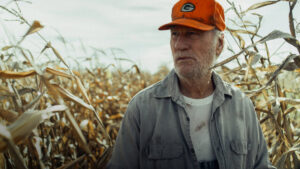Publication Date: 01-30-2025
Green and Gold (2025) review
Dir. Anders Lindwall
By: Steve Pulaski
Rating: ★★
As a die-hard, (nearly) lifelong Chicago Bears fan, you know right off the bat I don’t go out of my way to read about nor invest much time in the Green Bay Packers. Even as an NFL fan, they’re the team to which I pay the least attention. I find the Jacksonville Jaguars more exciting, frankly.
I can’t let my bias affect Green and Gold (brought to you by Culver’s), a new film that bleeds its titular colors. Funnily enough, the characters’ obsession with the Packers didn’t irritate me. The farmer’s pig, named “Ditka,” did get a smirk and an eye-roll out of me, though. The film’s noble intentions and authenticity are both endearing qualities, but both can’t save what is ultimately a predictable story greatly deduced in impact and emotion thanks to its terribly unlikable protagonist.

Craig T. Nelson plays Buck, a farmer in 1990s Wisconsin who is struggling to keep his acreage. He lives with his granddaughter, Jenny (Madison Lawlor), an aspiring singer-songwriter, who desperately wants to leave her little slice in the middle of nowhere for the presumed greener pastures of Nashville. One day, a loan officer comes knocking and tells Buck he’s going to repossess the land due to unpaid debts. Recognizing Buck’s desperation, he makes him a deal: if the Green Bay Packers, his favorite team, win the Super Bowl, he will wipe his debts.
The future of his property comes down to a football team. Unfortunately, this is one of the seasons where the team is all over the place; up-and-down in the standings, waffling between winning and losing streaks, guided by the gunslinging tendencies of Brett Favre.
Buck is the overarching problem with Green and Gold. For starters, his problem is his own doing. His farm isn’t underwater because of a personal tragedy. He’s not grief-stricken, for his wife (Annabel Armour) is alive and well, and he has no real reason to spit on Jenny’s dreams of a bigger life. The farm is in trouble because he didn’t pay back his loans, which doesn’t ordinarily garner much sympathy among the film’s bootstrap demographic. His cantankerous attitude is unjustifiable because this is a mess of his own making. We’re supposed to admire him because he spent his entire life working so hard that he forgot to make a life.

To say Green and Gold was made with good intentions appears to be an understatement. A lifelong resident of the Midwest, I long for representation of “flyover country.” The film was shot in Door County, Wisconsin, a scenic region of the Midwest I highly recommend. The film is the product of brothers Anders (director) and Davin Lindwall (producer), who clearly have decades worth of dirt on their boots. The rural lifestyle they showcase is an unforgiving one. Tis pity their main character is miserable to the point where he brings the movie down with him.
When you break it down, Green and Gold is a story about a Christian farmer, who took out so many loans that he makes a degenerate bet on his football team in order to save his property, and a handout proves to be his saving grace. To say the irony will be lost on the film’s target audience is as accurate as saying the Packers themselves will almost exclusively be a team that’s good enough to make the playoffs yet too conservative to go “all-in” for a chance to be great.
NOTE: I wrote an article about Green and Gold, and its connection to Wisconsin and the state’s farming community for Y105, my radio station. You can find it here.
Starring: Craig T. Nelson, Madison Lawlor, Annabel Armour, Brandon Sklenar, M. Emmet Walsh, and Charlie Berens. Directed by: Anders Lindwall.
About Steve Pulaski
Steve Pulaski has been reviewing movies since 2009 for a barrage of different outlets. He graduated North Central College in 2018 and currently works as an on-air radio personality. He also hosts a weekly movie podcast called "Sleepless with Steve," dedicated to film and the film industry, on his YouTube channel. In addition to writing, he's a die-hard Chicago Bears fan and has two cats, appropriately named Siskel and Ebert!


